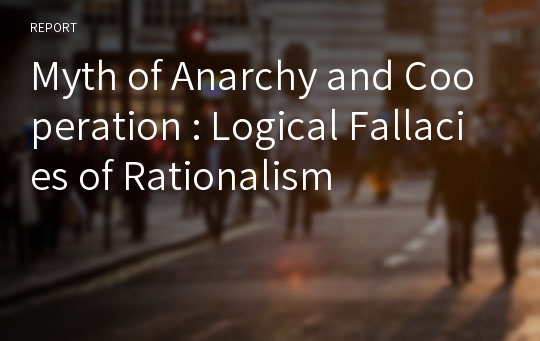Myth of Anarchy and Cooperation : Logical Fallacies of Rationalism
*산
다운로드
장바구니
소개글
본 논문은 제가 런던정경대(London School of Economics & Political Science)의 국제관계학 석사 졸업 논문으로 제출하였던 것이며, 69점을 받았습니다. (일반적으로 70점 이상은 전체 학생의 5%에게 부여, US GPA 로 환산 시 A0로 보시면 됩니다.)Critical Theory의 관점에서 Neo-realism 과 Neo-liberal Institutionalism을 비판한 논문이며, 지도교수께서 많은 칭찬을 해주셨습니다.
논문을 통째로 퍼다가 표절하는 일은 삼가주시길 요청드리오며, Idea Generation의 관점에서 읽어주시길 바랍니다.
참고로 제 Essay 및 논문을 표절의 형식으로 사용하시지 않길 요청드리며, idea generation 의 참고자료로 사용하시길 부탁드립니다
목차
I. Introduction 1II. Myth of Anarchy 5
II – I. Neo-realist Assumption of Anarchy 5
II – II. Two conceptions of Anarchy : Hobbesian and Waltzian ones 7
II – III. Problematising Neo-realist Definition of Anarchy 10
II – IV. Sub-conclusion :
Self-contradiction – Three Characteristics of System Structure 17
III. Myth of Cooperation 23
III – I. Neo-liberal Assumption of Cooperation 23
III – II. Problematising the Definition of Cooperation 25
III – III. Power and Interdependence 27
III – IV. Dogma of Unlimited Rationality 32
III – V. The Role of Norms and Values : Slavery of Ideology 35
III – VI. Sub-conclusion :
Harmony, Cooperation, Pseudo-cooperation, Enforcement and Discord 39
IV. Conclusion 43
Bibliography 46
본문내용
The primary aim of my dissertation is to clarify ontological definitions of two key concepts in neo-realism and neo-liberal institutionalism. Those who see anarchy as the ordering principle are apt to have a mythical belief that states have free-will and can do whatever they want. It is true but only for core states and the states in hegemonic status. Asymmetrical power relationship severely constrains actors in a weaker position in exchange for the benefits for those who are stronger.Same critique goes to the concept of cooperation defined by neo-liberal institutionalism. The issue of power and interdependence should be addressed in a different way from neo-liberals do. The relationship between power and interdependence is essentially not a question of whether hegemons can provide rules and norms for cooperation. This argument already presumes that power intrudes in decision making process since hegemons, as rational actors, do not allow unfavorable norms and rules for themselves. This is not a question of whether cooperation is still possible without the existence of hegemons, either. This should be how ‘hierarchic nature of international structure’ enforces the marginalized states to obey the world order generated by the stronger core states.
참고 자료
Axelrod, Robert., and Keohane, Robert. “Achieving Cooperation under Anarchy : Strategies and Institutions”, World Politics 38 , no.1, (1995).Baldwin, David. “Neoliberalism, neorealism and world politics, in Neorealism and Neoliberalism : The Contemporary Debate edited by David Baldwin, (New York : Columbia University Press, 1993).
Brown, Chris. Understanding International Relations, (London : Macmillan Press Ltd, 1997), 1st edition.
Brown, Chris. Understanding International Relations, (London : Palgrave, 2001), 2nd edition.
Bull, Hedley. “Does Order Exist in World Politics?” selected reading in Paul R. Viotti and Mark V. Kauppi eds., International Relations Theory : Realism, Pluralism, Globalism and Beyond, (London : Allyn and Bacon, 1999), 3rd edition.
Buzan, Barry., Jones, Charles., and Little, Richard. The Logic of Anarchy : Neorealism to Structural Realism , (New York : Columbia University Press, 1993).
Chomsky, Noam. 9-11, (New York : Seven Stories Press, 2001).
Cox, Robert. R. “Social Forces, States, and World Orders : Beyond International Relations Theory”, in Robert W. Cox and Timothy J. Sinclair eds., Approaches to World Order, (Cambridge : Cambridge University Press, 1996).
Cox, Robert. W. "Civil-society at the Turn of Millennium : Prospects for an Alternative World Order", Review of International Studies 25, (1999).
Evans, Graham. The Penguin Dictionary of International Relations, (London : Penguin Books, 1998).
Galtung, Johan. "A Structural Theory of Imperialism", Journal of Peace Research 2 (1971).
Gerald Gaus, Political Concepts and Political Theories, (Colorado : Westview Press, 2000).
Gilpin, Robert. Global Political Economy : Understanding the international economic Order, (Oxford : Princeton University Press, 2001).
Gruber, T. R. “A translation approach to portable ontologies”, Knowledge Acquisition 5, no. 2, (1993).
Halliday, Fred., and Rosenberg, Justin. “Interview with Ken Waltz”, Review of International Studies 24, (1998).
Hobbes, Thomas. Leviathan, (Oxford : Basil Blackwell, 1946).
Hollis, Martin., and Smith, Steve. Explaining and Understanding International Relations, (Oxford : Clarendon Press, 1991).
Horsman, Mathew., and Marshall, Andrew. After the Nation-State : Citizens, tribalism and the New World Disorder, (USA : HarperCollins Publishers, 1995).
Ikenberry, John. “American Power and the Empire of Capitalist Democracy”, Empires, Systems and States : Great Transformations in International Politics, (Cambridge : Cambridge University Press, 2001).
Jervis, Robert. "Realism, Game Theory and Cooperation", World Politics 40, no. 3, (1988).
Jervis, Robert. "Realism, Neoliberalism, and Cooperation : Understanding the Debate", International Security 24, no. 1, summer (1999).
Kegley Jr, Charles. W., & Wittkopf, Eugene. R. World Politics : Trend and Formation , (Boston : Macmillan Press Ltd, 1999), 4th edition.
Keohane, Robert. O. After hegemony : Cooperation and Discord in the World Political Economy, (Princeton : Princeton University Press, 1984).
Keohane, Robert. O., and Nye, Joseph. N. Power and Interdependence, (USA : HaperCollinsPublishers, 1989), 2nd edition.
Linklater, Andrew. “Rationalism” in Scott Burchill, Richard Devetek, Andrew Linklater, Matthew Paterson, Christian Reus-Smit and Jacqui True eds., Theories of International Relations, (Hampshire : Palgrave, 2001), 2nd edition.
Linklater, Andrew. “The Question of the Next Stage in International Relations Theory : A Critical-Theoretical Point of View”, Millennium 21. no.1, (1992).
Morgenthau, Hans. Politics among Nations : The Struggle for Power and Peace, (USA : McGraw-Hill, 1993), Brief Edition.
Reus-Smit, Christian. “Constructivism” in Scott Burchill, Richard Devetek, Andrew Linklater, Matthew Paterson, Christian Reus-Smit and Jacqui True eds., Theories of International Relations, (Hampshire : Palgrave, 2001), 2nd edition.
Rowlands, Ian. H. The Politics of Global Atmospheric Change, (Manchester : Manchester University Press, 1995).
Viotti, Paul. R., and Kauppi, Mark. V. International Relations Theory : Realism, Pluralism, Globalism and Beyond, (London : Allyn and Bacon, 1999), 3rd edition.
Waltz, Kenneth. N. "Realist Thought and neorealist Theory" in Controversies in International Relations Theory : Realism and the Neoliberal Challenge, edited by Charles W. Kegley Jr, (New York : St. Martin’s Press, 1995).
Waltz, Kenneth. N. "Structural Realism after the Cold War", International Security 25, no. 1.
Waltz, Kenneth. N. “Globalization and American Power”, The National Interest, Spring (2000).
Waltz, Kenneth. N. “Introduction : Globalization - A Necessary Myth?” in Paul Hirst and Grahame Thompson eds., Globalization in question : the international economy and the possibilities of governance, (Cambridge : Polity Press, 1996).
Waltz, Kenneth. N. Man, the State and War, (New York : Columbia University Press, 1959).
Waltz, Kenneth. N. Theory of International Politics, (New York : Random House, 1979).
Wendt, Alexander. “Anarchy is What States Make of It : The Social Construction of Power Politics”, International Organization 46, no.2, Spring, (1992).
Woods, Ngaire. “The Political Economy of Globalization”, in The Political Economy of Globalization edited by Ngaire Woods, (London : Macmillan Press Ltd, 2000).





























